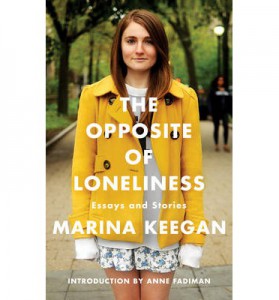
As I mentioned in Reading Week #19, I spotted The Opposite of Loneliness in the bookshop a couple of times before realising what it was.
The book is a collection of stories and essays by Marina Keegan, a 22 year-old writer who died in a car accident just 5 days after graduating magna cum laude from Yale University.
I remembered the story from May 2012 and, after getting past the Instagram-esque cover, realised I’d like to read her work.
It’s easy to compare Marina Keegan with Lena Dunham, who quipped in Girls that she wanted to be the voice of a generation – or at least a voice of a generation. Keegan and Dunham speak from the experience of the same generation, but at different ages. Dunham became known for Tiny Furniture, a film which captures the post-graduate experience of the Millenial boomerang kid (to put as many clichés into one sentence as possible). Keegan, in comparison, was still an apprentice of her trade – albeit one with great promise.
Keegan had written extensively for classes at Yale and for student papers. She had interned at the New Yorker, and had a staff job lined up there. Her work in this collection is younger, more idealistic, and with less life experience than Dunham’s early work, but it’s clear that it shows great promise.
As Kevin Roose writes in his article Remembering Marina Keegan, some of her writing is deeply prescient. From Kevin’s article:
The Opposite of Loneliness, is borrowed from an essay Marina wrote in order to mark her graduation. It’s the loveliest piece of writing I’ve ever seen from someone so young, and wrenching in its irony: “We have these impossibly high standards and we’ll probably never live up to our perfect fantasies of our future selves. But I feel like that’s okay,” she wrote. “We’re so young. We’re so young. We’re twenty-two years old. We have so much time.”
The first two stories in this collection are also concerned with death, successfully leveraging grief for empathy between characters (Cold Pastoral) and less successfully, almost for shock (Reading Aloud).
An interest in death also seeps into her non-fiction, like in the essay Why We Care About Whales. The essay asks why we’re so concerned with the well-being of whales at the expense of fellow humans. Her words, at points, invite us to become the whale – then reminds us that we aren’t; but that we are human – a fact that is not reflected in what we appear to care about.
Even more presciently, in an essay about her Celiac disease, she spends an entire opening paragraph proclaiming her death bed menu, which she dreamt would include a burger, a pizza, and other gluten-heavy foodstuffs.
Foresights aside, my personal highlights include the story of her first car (Stability in Motion) as a pillar of nostalgia, in place of a teenaged diary. I also enjoyed A Song For the Special, which acts as a manifesto for creative Millenials. The Internet opens us up to possibilities, but also breeds jealously. Interestingly, in this piece she presumes that she is special and acknowledges this presumption and its problems. As it turns out, she was.
She also takes on this notion in Even Artichokes Have Doubts – a political piece in which she examines the rate of promising graduates’ willingness to sign up for financial sector jobs at the expense of their artistic dreams. Yet she remains intimidated by their talent.
The tension between ambition and ability is very clear here, and is presented honestly. Keegan both strove to elevate her peers and was intimidated by them. For me, that makes this book a clear indicator that our generation is not one that not only must succeed but must see others fail. It’s proof of a sharing economy, and one that takes the success of others in their ventures as inspiration for our own. I think Marina’s book can do that, and more, for many others.